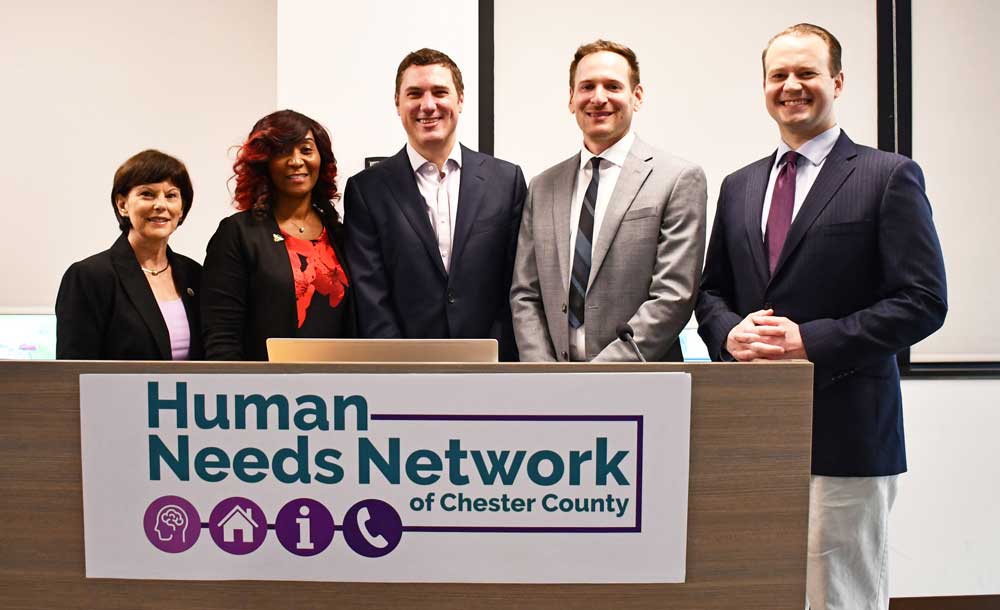
Chester County Commissioners Marian Moskowitz (left), Josh Maxwell (center) and Eric Roe (right) with Bridget Brown, Behavioral Health Crisis Response Program Director, and Joshua Bitler, Information & Referral Director for the new Human Needs Network of Chester County.
This week, the Chester County Commissioners and the Department of Human Services unveiled the Human Needs Network of Chester County, an initiative that brings a local focus on helping residents experiencing mental health concerns or a crisis, who are impacted by behavioral health issues, or who are experiencing a housing crisis.
At the core of the Human Needs Network is a locally-based contact center and mobile crisis resolution teams.
The contact center runs the 2-1-1 information and referral service for those in need of housing, utility, and other human service support, and the 988 toll-free suicide and crisis lifeline is a 24/7 service staffed by trained mental health counselors that can dispatch local mobile crisis resolution team members if needed. Both contact center services are based in the County’s Government Services Center in West Chester.
The mobile crisis resolution teams provide round-the-clock support, meeting those experiencing a mental health crisis and giving personal peer-led care. The mobile crisis resolution teams are based in the new Equity Health Center in Coatesville.
“The mobile crisis team service is a transformational part of this new program,” said Chester County Commissioners’ Chair Josh Maxwell. “Having professionally-trained peers called out to meet with individuals who are going through a crisis any time day or night will not only help the individual, it will also significantly decrease the number of times that either law enforcement or emergency medical services are unnecessarily called out.
“Mental health crisis needs should be met by those who are prepared, trained, funded, and have lived-experience. That is what the new mobile crisis response teams will do,” added Commissioner Maxwell.
The Human Needs Network of Chester County was developed with input from leaders of more than 50 local organizations who represent all sectors of the community – from first responders, schools, hospitals and libraries to nonprofits and veteran organizations, the United Way of Chester County and County government departments.
Chester County Commissioner Marian Moskowitz noted, “We have all seen how mental and behavioral health needs have skyrocketed, particularly through the pandemic, so the challenges that our own County departments and organizations across the county have faced have led us to focus on a better system of care, and one that is local.
“The people who have guided us in creating the Human Needs Network are now serving on the Advisory Board to help us build upon it and identify additional needs.”
The three “pillars” of the Human Needs Network of Chester County are: Someone to talk; Someone to respond; and Somewhere to go.
“The first two pillars are now in place,” said Pat Bokovitz, Director of the Chester County Department of Human Services. “’Someone to talk’ is met by our contact center staff, answering the 2-1-1 and 988 calls. ‘Someone to respond’ is covered by our mobile crisis resolution teams.
“The third pillar, ‘Somewhere to go’ currently includes walk-in center and crisis residential services offered by organizations like Holcomb Behavioral Health Systems, and in-patient and out-patient treatment through Haven Behavioral Hospital of West Chester. A further extension of the Human Needs Network could see the development of a mental health urgent care model,” added Bokovitz.
The cost of the Human Needs Network of Chester County is covered by Chester County’s American Rescue Plan Act funds.
“The greatest amount of Chester County Government ARPA money has been directed to mental health and related behavioral health services,” said Chester County Commissioner Eric Roe. “These investments serve mental health and suicide prevention services within schools, fund mental health and trauma therapy counseling and trauma-informed mentors and coaches, and support the work of the Chester County Suicide Prevention Task Force.
“The addition of the Human Needs Network is significant and is a service that our Chester County communities deserve.”
Chester County has contracted with Holcomb Behavioral Health Systems for the 988 suicide and crisis lifeline, and with Woods’ Legacy Treatment Services to oversee the mobile crisis resolution teams.






